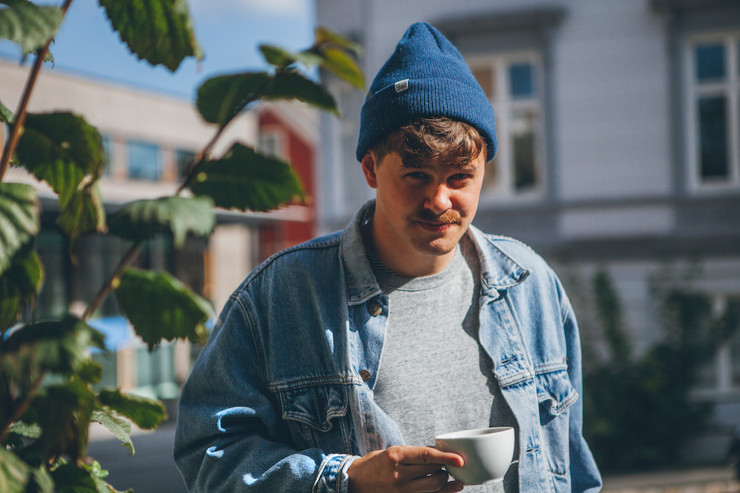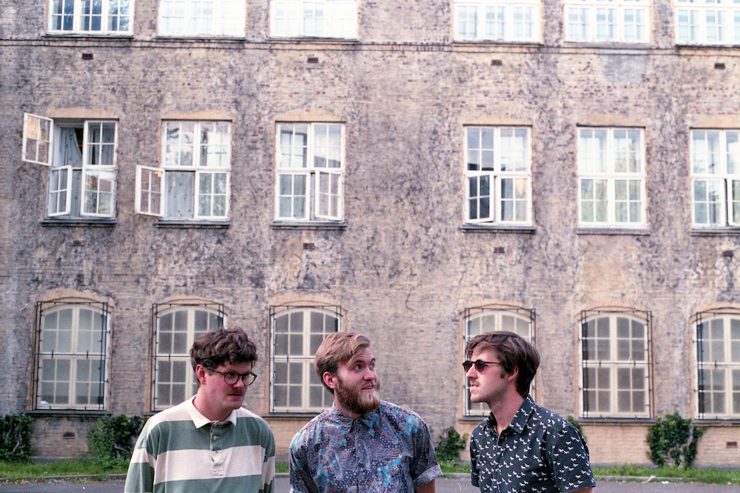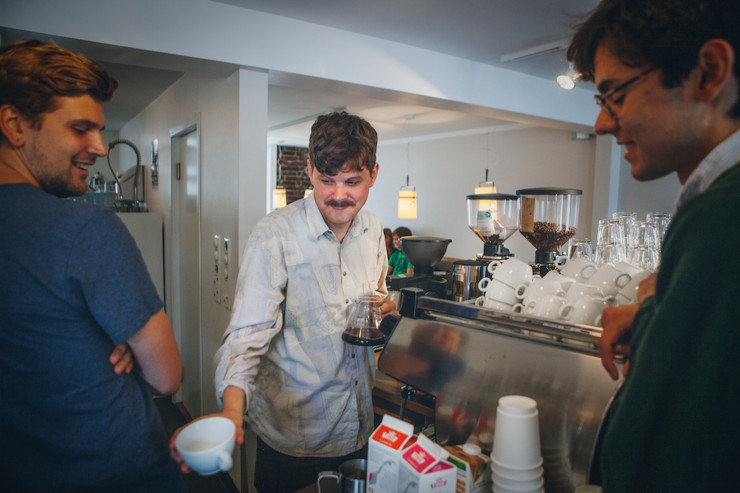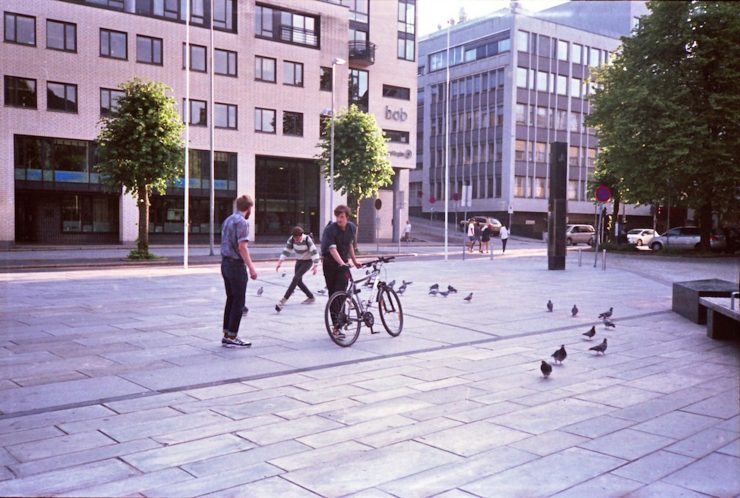This is the first in a new occasional series of articles profiling baristas and other folk who are working in coffee as they work on other things. Coffee can be an all-consuming career, but making and sharing this beverage can also be a fulfilling complement to a life filled with other passions.
Frode Boris Bakken is a barista at Blom, a multi-roaster coffee shop in Bergen, Norway–a dreamy gem of a city surrounded by mountains and water. He’s also a musician, a DJ, and a student currently pursuing a master’s degree in social anthropology. My only in-person interaction with Frode was a year ago at Blom when we chatted briefly as he brewed me coffee, but I still clearly remember his wonderfully dry sense of humor and immediately likeable disposition. I tracked him down through a mutual friend and asked him a few questions over email about his life both behind and beyond the bar.
When you’re not working as a barista, you’re also a musician and DJ. Could you tell me about the band you’re in and the kind of music you make?
I play keyboards in a band I have with a couple of friends. We’re called Chain Wallet, but don’t get fooled by our badass name—we basically play dreamy pop music. We share a fascination for surf music from the 60s, and we listen to a lot of new wave and post-punk bands from the 1980s. There are also some shoegazing bands from the 90s that we think are really cool. But, Chain Wallet is not one of those retro pastiche bands that you hear on the radio from time to time. It’s a next-level indie pop project. On the side I try to make house music. I love cosmic Oslo disco as much as the next guy, fronted by geniuses like Todd Terje, Lindstrøm and Prins Thomas. Of course these acts influence me, but I’m also really into house music from the late 80s to the mid 90s. So my solo project sounds a bit like cheesy old school house classics, but in a Nordic contemporary context.
What influences and inspires your music?
I’m inspired by visuals in general. When I watch a movie for instance, a certain scene or atmosphere can give me a special sentiment that I might want to reinterpret with music. When we listen to a demo we’ve just recorded, I like to play back footage from an old film to get a feeling of what we’ve been making. These images can sometimes inspire the sound and point out the direction of the song. Often my bandmates get mildly annoyed by the fact that I always put on these beautiful YouTube clips. We have a really poor Wi-Fi signal up in the studio, and the videos takes forever to buffer. The town of Bergen itself is also very inspiring. We have notoriously bad weather because of our epic mountains, and both the weather and the epic mountains inspire me. It’s also inspiring to be surrounded by a horde of great bands like Young Dreams and Put Your Hands Up For Neo-Tokyo.
Could you tell me about your background? What brought you to Bergen?
I grew up on the southwest coast of Norway, in Stavanger, the oil capital of the country. Most of the people there are quite rich, but they have no taste, and that’s why there aren’t any serious coffee spots. Well, there is this one place that will make you a cup of V60, but they do it freestyle, and they’re not particularly good at it. My plan was always to move from Stavanger after high school, but I didn’t know where I wanted to move. The main reason for me moving to Bergen is that it’s an awesome city. It’s Norway’s second biggest city, and yet it feels quite small. Everybody should move to Bergen. Of course, Oslo is better known in the coffee world, and Bergen is much smaller in size, but the few good cafés that we have are really outstanding.
How did you first get into coffee?
I opened my eyes for what coffee could be six years ago, when I had just moved here. I used to drop by a coffee shop near my apartment, and I always ordered an Americano—I thought this to be the best choice if I wanted to avoid sour, possibly hour-old coffee. After about a week of Americanos, the barista approached me and said, “You know, we do serve really good filter coffee here,” and made me try some. “This one’s from India, and tastes kind of like nuts,” he told me. I didn’t particularly like the coffee, but I could definitely taste the nutty notes. This intrigued me, and the next day I was back for more. After a cup from central Kenya, with berry flavors, I was hooked. It turned out to be a lot more to coffee than I had previously thought! The barista who served me these first cups eventually hired me to work in his new hand-brew focused coffee shop—Blom.
How long have you been working at Blom?
I started working here three years ago. Most of our coffee is roasted in Oslo, but we have some coffee from the Ålesund-based roaster Jacu. Sometimes we have guest coffees from Sweden and Denmark. I was trained by Rasmus Helgebostad, two-time winner of the Norwegian Barista Championship. One summer Rasmus and I worked as backstage baristas, brewing V60s for bands at the Hove Festival. He was a really cool mentor. Unfortunately for me he moved to be with his girlfriend in Oslo.
Are there any coffees that you’ve found to be particularly delicious lately?
There are a lot of good Kenyan coffees in season right now! I am really fond of the Mutheka from Tim Wendelboe. It is a classic SL-28 and SL-34 from Nyeri. I am also quite blown away by the Kenya Kii from the Ålesund-based coffee roaster Jacu. Those guys are on to something truly fantastic.
What’s your favorite and least favorite part of being a barista?
The best thing about being a barista is that I get to work with coffee of very high quality, and that I can spend a lot of time on understanding exactly what coffee is and can be. For anthropologists like me, humans are really interesting, and in this job I get to meet a lot of remarkable people. My least favorite thing about being a barista is maybe when I’m not working, when relatives etc. expect me to make delicious coffee at dinner parties, from cheap pre-ground coffee, without my gear.
You recently spent six months in Paris doing field research for your master’s degree. What was your impression of Paris’s coffee culture?
During my anthropological fieldwork in Paris I focused on examining the relationship between taste and identity, and more specific “good tastes” as an identity marker. I’ve had stressful experiences with the Parisian coffee in the past, and six months is a long time, so I came prepared with literally an extra suitcase of coffee gear and a kilo of Scandinavian light-roast coffee. But it turned out to be an unnecessary precaution. The Parisian coffee culture had blossomed, with a lot of new and ambitious coffee places. Three years ago I had to run all over town in order to get myself a decent cup of coffee. The Parisian roasters like Belleville Brûlerie and Café Lomi know what they’re doing. Several of my all-time favorite cafés are Paris-based. They roast darker than what I’m used to, but it’s still so good. I guess the French people wouldn’t buy the coffee if they roasted lighter—it takes time to change the coffee habits of a nation that already thinks its coffee is quite good.
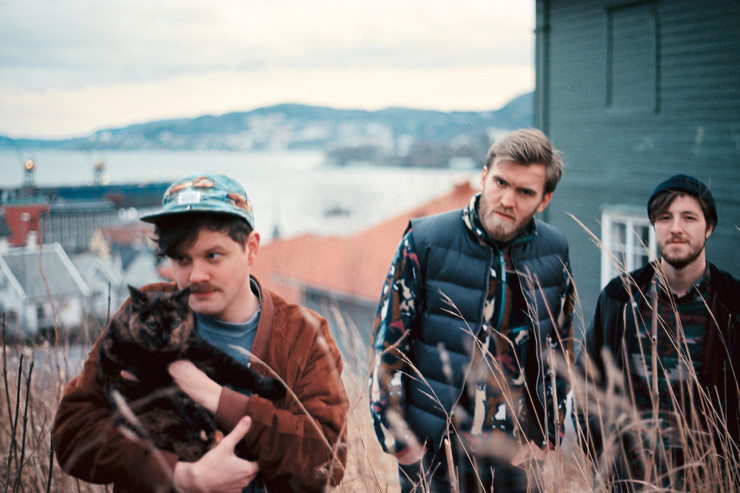
What is Bergen’s music scene like? Where’s your favorite place in town to watch a show?
There’s an expression among the national music journalists in Norway: “The Bergen Wave.” It started with acts like Kings of Convenience and Röyksopp in the early 2000s, and since then every new and interesting band from Bergen has been tied to some new Bergen Wave. I don’t really believe in the concept—I see it more as a constant stream of cool music emerging from the city. The music scene here is quite inbred though; everybody is playing in each other’s bands. Landmark is my favorite place for concerts. On its wall-to-wall carpet you can witness great bands like Beach Fossils or DJs like John Talabot, thanks to the efforts of the booking people at Perfect Sounds Forever and Nabovarsel. Bergen could need some more venues for this kind of music, as the real rockers tend to dominate the other places.
What’s next on your horizon?
In one year’s time, I will have hopefully earned my master’s degree in social anthropology, which means that I’ll have a degree in something I find truly interesting, but not necessarily that I will get a relevant job. I would love it if there were a job that could combine music, anthropology and coffee—that would be my dream job.
Joanna Han is a contributing editor at Kinfolk Magazine, and a Sprudge contributor based in Portland, Oregon. Read more Joanna Han on Sprudge.


